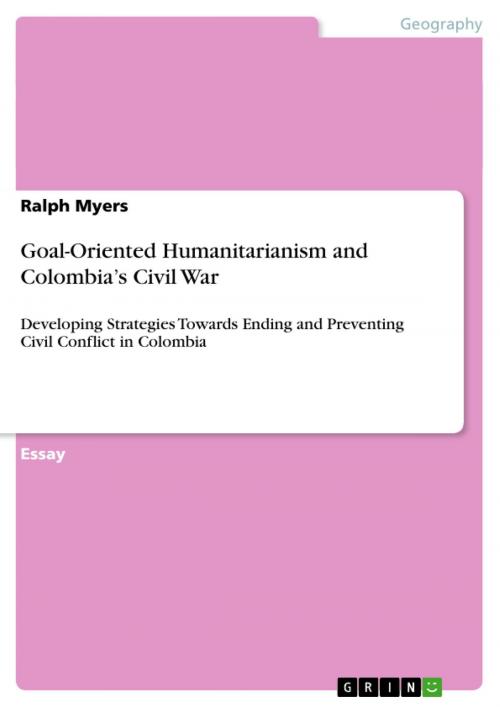Goal-Oriented Humanitarianism and Colombia's Civil War
Developing Strategies Towards Ending and Preventing Civil Conflict in Colombia
Nonfiction, Science & Nature, Science, Earth Sciences, Geography| Author: | Ralph Myers | ISBN: | 9783656442073 |
| Publisher: | GRIN Verlag | Publication: | June 5, 2013 |
| Imprint: | GRIN Verlag | Language: | English |
| Author: | Ralph Myers |
| ISBN: | 9783656442073 |
| Publisher: | GRIN Verlag |
| Publication: | June 5, 2013 |
| Imprint: | GRIN Verlag |
| Language: | English |
Essay from the year 2011 in the subject Earth Science / Geography - Geopolitics, grade: 79%, University College Dublin, language: English, abstract: Humanitarian organisations have always realised that their activities have geopolitical consequences and that they are inseparably linked to the political world. However, since the 1990's, humanitarian organisations have increasingly begun acting upon this awareness (Barnett 2005: 724). The watershed for this transformation from minimalist assistance provision to goal-oriented humanitarianism, was the decision of numerous humanitarian organisations to pull out of Rwandan refugee camps in Zaire. The argument was that these camps were being used by Hutu genocidaires to launch violent attacks on Rwandan soil (Fox 2001: 279-280, 285-288). The shift to goal-oriented humanitarianism has resulted in 'a broad trend towards an increased use of humanitarian assistance as part of a more comprehensive strategy to transform conflicts and decrease the violence' (Uvin 1999: 8). This paper identifies three strategies in which humanitarian organisations can address the root causes of conflict in the 21st century: disaster risk reduction (DRR), the decision to withhold or focus aid in specific areas, and speaking out. DRR is usually executed pre-conflict or during periods of reduced violence, whilst the latter two are relevant at the time of conflict. The main aims of this paper are to examine the phenomenon of civil war from a geopolitical perspective and identifying variables linked to both the onset and duration of civil conflict, specifically in the case of Colombia. The conclusions drawn here should assist humanitarian organisations present in Colombia, in identifying ways to implement the above three mentioned strategies so as to address the root causes of civil war. Halting conflict and preventing future reoccurrence of civil war is in the direct interest of Colombian based humanitarian organisations, as many of them work with internally displaced persons (IDPs). As Ibáñez and Vélez (2008: 672) note: 'Violence and security perceptions are the major determinants of displacement and are, therefore, the key instruments in preventing displacement.'
Essay from the year 2011 in the subject Earth Science / Geography - Geopolitics, grade: 79%, University College Dublin, language: English, abstract: Humanitarian organisations have always realised that their activities have geopolitical consequences and that they are inseparably linked to the political world. However, since the 1990's, humanitarian organisations have increasingly begun acting upon this awareness (Barnett 2005: 724). The watershed for this transformation from minimalist assistance provision to goal-oriented humanitarianism, was the decision of numerous humanitarian organisations to pull out of Rwandan refugee camps in Zaire. The argument was that these camps were being used by Hutu genocidaires to launch violent attacks on Rwandan soil (Fox 2001: 279-280, 285-288). The shift to goal-oriented humanitarianism has resulted in 'a broad trend towards an increased use of humanitarian assistance as part of a more comprehensive strategy to transform conflicts and decrease the violence' (Uvin 1999: 8). This paper identifies three strategies in which humanitarian organisations can address the root causes of conflict in the 21st century: disaster risk reduction (DRR), the decision to withhold or focus aid in specific areas, and speaking out. DRR is usually executed pre-conflict or during periods of reduced violence, whilst the latter two are relevant at the time of conflict. The main aims of this paper are to examine the phenomenon of civil war from a geopolitical perspective and identifying variables linked to both the onset and duration of civil conflict, specifically in the case of Colombia. The conclusions drawn here should assist humanitarian organisations present in Colombia, in identifying ways to implement the above three mentioned strategies so as to address the root causes of civil war. Halting conflict and preventing future reoccurrence of civil war is in the direct interest of Colombian based humanitarian organisations, as many of them work with internally displaced persons (IDPs). As Ibáñez and Vélez (2008: 672) note: 'Violence and security perceptions are the major determinants of displacement and are, therefore, the key instruments in preventing displacement.'















